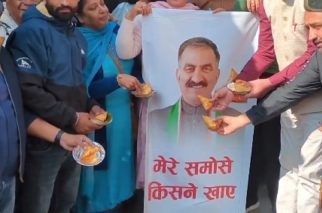Rs 10 samosa bought for Rs 150! How a simple snack turned political hot potato for Himachal CM

- ‘Bharat Mata…’ Wife’s last salute in Mandi as Himachal martyr killed in J&K laid to rest - November 12, 2024
- BJP leaders ‘gulped chapattis worth Rs 6 crore’ at Jan Manch events: Himachal Congress counters samosa controversy - November 12, 2024
- How Vigilance laid trap to catch Padhar SHO in Mandi red-handed taking Rs 15,000 bribe - November 12, 2024
MANDI: What began as a routine bill for refreshments at a government meeting has transformed into a significant political controversy in Himachal Pradesh.
A samosa generally costs Rs 10 to Rs 20 in the market, but it was bought for Rs 150 from Shimla’s upscale Radisson Blu Hotel, one of the city’s most expensive establishments.
The samosas were ordered from Radisson Blu as the CID headquarters, where the Chief Minister Sukhvinder Singh Sukhu had arrived for an event, is located nearby.
In a statement to a media channel, the hotel’s vice-president provided details about the October 21 order. He explained that each plate of samosas, containing three pieces, is priced between Rs 400 and Rs 450, including tax.
Additionally, two loaf cakes were ordered that day, with each cake costing Rs 450.
According to the vice-president, each samosa costs around Rs 150, so a plate of three samosas comes to approximately Rs 450.
A total of 21 samosas were purchased, along with two dry cakes, which are typically sliced into 12 pieces each. This led to a final bill of roughly Rs 4,150 paid to Radisson Blu for the samosas and cakes served at the event.
This unlikely “samosa scandal” has since dominated headlines and become a focal point in the state’s politics, raising broader questions about government expenditure, financial discipline and political manoeuvering.
The controversy began after a document surfaced online, showing the samosa bill. In a state where inflation and economic challenges are top concerns, the seemingly trivial expense quickly triggered public scrutiny.
The “hefty” bill gave rise to an uproar as people questioned why the government was spending taxpayer money on what appeared to be lavish refreshments for officials.
The Sukhu administration, however, was quick to respond, stating that the details of the bill had been exaggerated and that routine hospitality costs were misconstrued as personal indulgence.
Sukhu administration under fire
As criticism mounted, Sukhu’s government explained that such expenses were part of standard meeting protocols and were neither personal nor unusual.
They argued that government meetings often involve hospitality costs, and the sum cited was inflated by misinformation.
Sukhu’s team claimed that the expense was being politicized by the opposition to divert attention from more pressing issues.
However, in the eyes of the public, the response fell short of fully quelling concerns, as the figure associated with the bill continued to spark debate and mockery.
Former Chief Minister Jai Ram Thakur and the BJP, quick to recognise a political opportunity, seized on the incident. They condemned the Sukhu administration, claiming the samosa scandal exemplified a larger pattern of wasteful spending and financial negligence by the government.
The BJP highlighted this incident as part of a broader campaign, calling for transparency and fiscal responsibility, and questioning the government’s commitment to the people of Himachal Pradesh during difficult economic times.
Jai Ram’s statements resonated with citizens frustrated by inflation and eager for assurances that public funds are used wisely.
As the scandal gained traction, it quickly became a top trending topic across social media platforms.
Memes, satirical posts, and public commentary flooded the internet, with users poking fun at the “Rs 5,000 samosas” and creating humorous takes on the incident.
The widespread discussion has kept the issue alive in the public mind, and local media outlets eagerly added to the coverage, further scrutinising the Sukhu administration’s spending practices.
The samosa controversy has since evolved into a wider conversation about the government’s accountability and the transparency of its expenditures.




